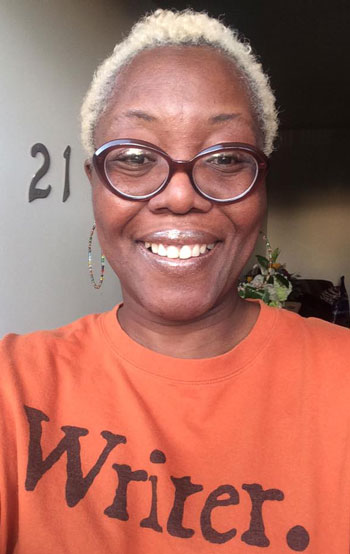
Photo courtesy of Danquah
Author, editor, journalist and public speaker Nana-Ama Danquah opens Eduardo Santiago’s Idyllwild Author Series on Sunday, July 10. This is year six for Santiago’s popular series, held at 4 p.m. Sunday, for five weeks, on the deck of Café Aroma.
Danquah is a compelling choice to open the series. Born in Ghana, she immigrated to the United States with her family when she was 6. She arrived with an accent and a cultural heritage very different from those found in the Maryland area north of the District of Columbia where her family settled.
“On one side was America, on the other was Ghana,” she wrote in a 1998 article, “Life as an Alien.” “And I didn’t know how to bring them together, how to make one make sense to, let alone in, the other. Why do you talk like that? Where are you from? Is that string in your hair? Newness is easy to detect, especially with immigrants.”
It was that societal disconnect, the need to fit in by adopting multiple situational personas, that caused Danquah to fall into years of depression. Finding her way and finding herself was painful. She was black and yet not a black American. She was exotic and an African. Whether with her young black or Hispanic American friends, she was always adjusting, adopting the cadences and lilts of their speech, to modify and redefine her own.
Her memoir, “Willow Weep for Me: A Black Woman’s Journey Through Depression” (One World/Galantine, 1999) is the story of her journey through depression and cultural disorientation to her emergence and embrace of the sum of all her parts. It is a story of healing that the Washington Post called “absorbing and inspirational” and former U.S. Surgeon General David Satcher called “a tremendous gift to all of us and to our understanding of depression and its pervasiveness throughout our society.”
Asked in interview whether her depression was linked to her early cultural disorientation as an immigrant, Danquah answered, “They are absolutely linked. It is the isolation of not being understood. And yet the more I assimilated the less I was understood. I was both people [Ghanaian and American] with this weird cognitive dissonance that comes from leaving a part of yourself behind.” It was not just the accent, she explained. It was the very different cultural norms. “Back then in Ghanaian culture, there was no ‘me, me, me’ as there was in the U.S. And one was not allowed to speak to elders in certain ways. For most immigrants there is a dance, a negotiation always trying to fit in.”
Danquah is the editor of three anthologies, and her articles and commentaries have been published in media outlets ranging from the Wall Street Journal, the Washington Post, the Africa Report, Allure to Essence.
In discussing how American language has devolved in abbreviations and twittered briefs, Danquah shared how she approaches her writing day. “I write personal letters every morning, writing with the personal knowledge that the recipient will not necessarily write you back.” She explained that writing in such a personal fashion to someone she knows helps free her to write her own books, not worrying if someone will buy the book and read it. “Writing the letters moves me further into language and wanting to tell a story. I think of my readers as listeners.”
Danquah said one Portuguese word, “saudade,” captures what it is to be an immigrant — a feeling of longing, melancholy and nostalgia which for her was a lifelong journey of trying to be whole when there was a part of her that was absent. “When I was young, there was a space for blonde Jennifer with the pom-poms but there was not a space for me.”
Santiago and Danquah will appear together at 4 p.m. Sunday, July 10, on the deck of Café Aroma. There is no charge for admission.










